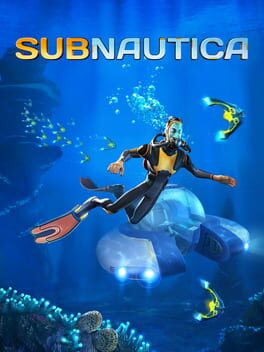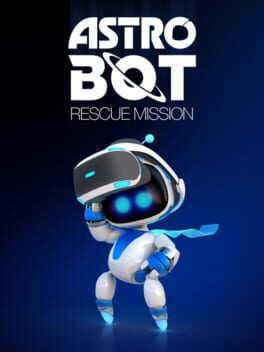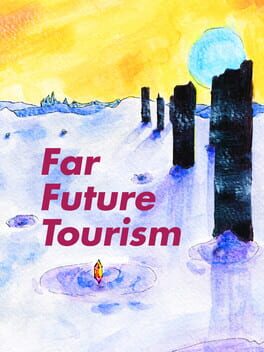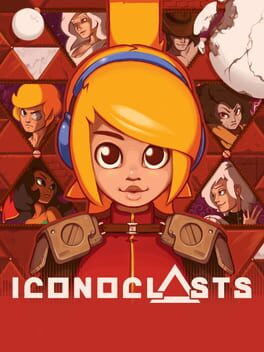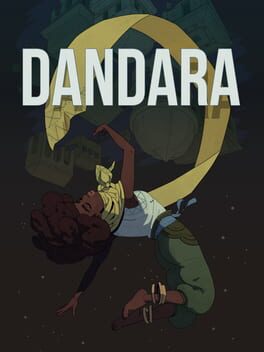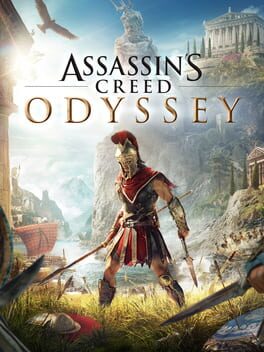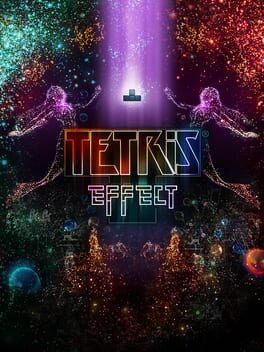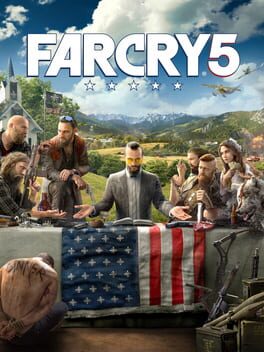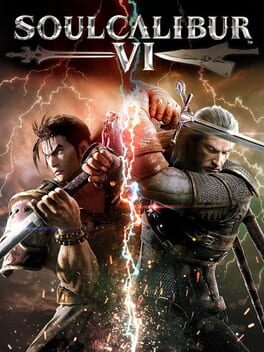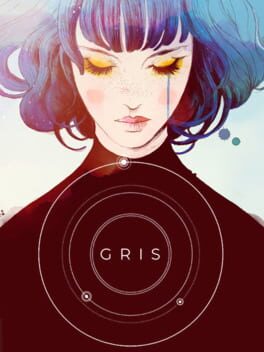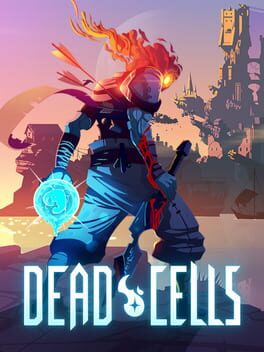nottevisthompson
2014
The terror of open water. The panic of caves. Always this tethering, to surface, to Seamoth, any pocket of air. I drink fields of color. I dive into the wreck. And I float here in space, this alien lightness, like I once did in pools, to hide my thick body. Dawn breaks just above, on the underside of waves, a sea-wrinkled sky.
For forty hours I hold my breath. I’m overwhelmed, transfixed, in perpetual disbelief. Water is so intimate, the way it envelops you, holds you. And tries to get in. It’s hypnotic but treacherous. And it is this exact combination of trance and threat that makes Subnautica not only exactly a videogame but the most beautiful game of the year.
How long can you last in this suffocating beauty? You’re always in danger of overextending yourself, and complete absorption will kill you. So you plan, you calculate, you hone your OCD and cultivate your humility. Because you will never dominate this ocean world. You’ll barely get a foothold. Forty hours in, it never stopped being mysterious or terrifying to me. I never tired of gazing out the viewing window I built just below the surface. I never stopped feeling vulnerable to it all.
What’s shocking is that a game this beautiful and intimidating also makes so much sense. And not just videogame sense. It has a natural logic and coherence throughout that is incredibly rare. From initial crash to progression via wreckage and fabrication to the revealed geography of its alien world, the game does not cheat. It makes a commitment to materiality and storage and all the struggles of liquid space. And it binds this vigilance to the most basic player motivation: the desire to explore. You make new tools not because the game forces you to but because each tool will help you see more. And you always want to see more. This focus is so compelling, and so completely realized, that even a few serious technical issues cannot detract from the final experience.
None of these qualities capture the quiet of this game, though. The stillness it draws out of me. Some nights I couldn’t play it because I didn’t have the calm. Driving my Cyclops submarine through Lost River and into the lowest depths required my complete preparation and attention. Extracting myself and all my materials afterwards somehow required even more. It was an ordeal, like any real journey, and it weighed on me. Floating there in the deep, so far from the surface, I would often think of the end of Jane Campion’s The Piano, one of my favorite movies. I would think of the ocean’s weird lullaby, of the buried selves floating below, of how part of me wanted to stay “in the cold grave — under the deep, deep sea.” Not death overcome, as in most videogames, but death contemplated and dwelled in. My usual voices hushed. This silence in me.
I’m back now, but like with any powerful experience, part of me is still anchored there. Still floating in the silence below. My speaking voice here on the surface, though, wants others to know: Subnautica is not only the greatest deep, deep sea game I’ve ever played, not only the greatest survival and exploration game I’ve experienced, it’s one of the greatest videogames of this generation.
For forty hours I hold my breath. I’m overwhelmed, transfixed, in perpetual disbelief. Water is so intimate, the way it envelops you, holds you. And tries to get in. It’s hypnotic but treacherous. And it is this exact combination of trance and threat that makes Subnautica not only exactly a videogame but the most beautiful game of the year.
How long can you last in this suffocating beauty? You’re always in danger of overextending yourself, and complete absorption will kill you. So you plan, you calculate, you hone your OCD and cultivate your humility. Because you will never dominate this ocean world. You’ll barely get a foothold. Forty hours in, it never stopped being mysterious or terrifying to me. I never tired of gazing out the viewing window I built just below the surface. I never stopped feeling vulnerable to it all.
What’s shocking is that a game this beautiful and intimidating also makes so much sense. And not just videogame sense. It has a natural logic and coherence throughout that is incredibly rare. From initial crash to progression via wreckage and fabrication to the revealed geography of its alien world, the game does not cheat. It makes a commitment to materiality and storage and all the struggles of liquid space. And it binds this vigilance to the most basic player motivation: the desire to explore. You make new tools not because the game forces you to but because each tool will help you see more. And you always want to see more. This focus is so compelling, and so completely realized, that even a few serious technical issues cannot detract from the final experience.
None of these qualities capture the quiet of this game, though. The stillness it draws out of me. Some nights I couldn’t play it because I didn’t have the calm. Driving my Cyclops submarine through Lost River and into the lowest depths required my complete preparation and attention. Extracting myself and all my materials afterwards somehow required even more. It was an ordeal, like any real journey, and it weighed on me. Floating there in the deep, so far from the surface, I would often think of the end of Jane Campion’s The Piano, one of my favorite movies. I would think of the ocean’s weird lullaby, of the buried selves floating below, of how part of me wanted to stay “in the cold grave — under the deep, deep sea.” Not death overcome, as in most videogames, but death contemplated and dwelled in. My usual voices hushed. This silence in me.
I’m back now, but like with any powerful experience, part of me is still anchored there. Still floating in the silence below. My speaking voice here on the surface, though, wants others to know: Subnautica is not only the greatest deep, deep sea game I’ve ever played, not only the greatest survival and exploration game I’ve experienced, it’s one of the greatest videogames of this generation.
Super Mario Odyssey was the most disappointing game of 2017. It was Mario as a completely modern videogame. Mario as content. With a bad moon economy, a tourism model of exploration, and the most unapologetic fanservice. Not an odyssey but a mockery. Mario Kibbles ‘n Bits. Mario Groupon. Mario Are You Being Served?
So it was the most welcome surprise to find that Astro Bot was not only the best Mario game of 2018, but the best Mario since 3D Land. In many ways, its heir. If the screen can’t get any more 3D, then we’ll just have to go further inside it ourselves. And what we find here is a fully arrived VR experience, perfectly suited to its own limits. There are no compromises or half measures. No nausea from movement or teleportation to hide its lack. It doesn’t apologize for or try to hide its limits but instead delights in them. Which is often the best response to our limits anyway: laughter. Let’s make a game of them.
This is the pleasure of constraint. I’m on a conveyor belt, every level a tunnel, and my little guy is crossing a bridge above me. Or he’s just around a corner up ahead. Or he’s running in circles somewhere beneath me. Point being, I can’t see him well. My view is decidedly sub-optimal. In a typically screened videogame, you would complain about the bad camera and strain against the controls to get a better view. But here, the strain is actually in your neck. You are the bad camera. Every player her own Lakitu.
There is such delight in this. Your body is centered, but you still have an avatar. And it is through this connection, this interplay that the haptic limits to current VR tech are downplayed and instead you feel your centered body anew. It’s not the same as the first person perspective of so many shooters. There you are not a body but a naked eyeball, untethered, flattened via the screen, more point-of-view than center. And this perspective is empowering. Without a body, without defined borders, what you see is the world.
But in VR, to bring your actual body in, its center, its limits, doesn’t empower you. It humbles you, just like in everyday life. You are a thing in the world, one of many, and what you see is a limited view, also one of many. And strangely, by combining the first and third persons and centering my actual body, an unexpected comedy emerges. My body, which I usually like to forget in games, becomes something dear, almost cute. Something to feel out again, gently, curiously, with laughter, even pleasure.
There are so many things to feel anew, which screenshots cannot capture. Heights that take your breath, waves that stifle it, caves that press in and enclose. Near and far, light and dark, the very fundaments of perception, you can feel them. Darkness is not a rectangle of black but the death of sight. Behind is somewhere you can never truly go. Everywhere textures tease. You can’t help but constantly reach out for things that are not there. There is no periphery to remind or frame or distract. You can’t check your phone. You can’t put on a podcast and chill. You have a headcrab on your face. It’s all in or get the fuck out.
I play Astro Bot and it’s as if I’ve never played videogames before. As if it all still lies ahead of me. That future feeling. I’ve known that feeling before. Super Mario Bros. in a Pizza Hut. Final Fantasy VII at Shane’s house. Grand Theft Auto III off the Old Santa Fe Trail. Demon’s Souls in Corte de Monterey. And now, here in that future, I’m still feeling…something. Not disappointed exactly. Their sequels had their moments. But I feel the struggle of all aging groundbreakers. For relevance. Vitality. New Ground. And I pause.
The language of VR hasn’t settled out yet, the genres haven’t calcified. And there are many obvious challenges to meet — bodies in motion, haptics, a basic solipsism. But I’m going to relish this future feeling a bit longer. It’s just a hope to feel new things, to keep feeling things anew. Soon enough videogames will do what videogames do. Domesticate. Capitalize. Sequelify. Turn a future feeling into a past we’re desperate to recover. But it’s not that future yet.
So it was the most welcome surprise to find that Astro Bot was not only the best Mario game of 2018, but the best Mario since 3D Land. In many ways, its heir. If the screen can’t get any more 3D, then we’ll just have to go further inside it ourselves. And what we find here is a fully arrived VR experience, perfectly suited to its own limits. There are no compromises or half measures. No nausea from movement or teleportation to hide its lack. It doesn’t apologize for or try to hide its limits but instead delights in them. Which is often the best response to our limits anyway: laughter. Let’s make a game of them.
This is the pleasure of constraint. I’m on a conveyor belt, every level a tunnel, and my little guy is crossing a bridge above me. Or he’s just around a corner up ahead. Or he’s running in circles somewhere beneath me. Point being, I can’t see him well. My view is decidedly sub-optimal. In a typically screened videogame, you would complain about the bad camera and strain against the controls to get a better view. But here, the strain is actually in your neck. You are the bad camera. Every player her own Lakitu.
There is such delight in this. Your body is centered, but you still have an avatar. And it is through this connection, this interplay that the haptic limits to current VR tech are downplayed and instead you feel your centered body anew. It’s not the same as the first person perspective of so many shooters. There you are not a body but a naked eyeball, untethered, flattened via the screen, more point-of-view than center. And this perspective is empowering. Without a body, without defined borders, what you see is the world.
But in VR, to bring your actual body in, its center, its limits, doesn’t empower you. It humbles you, just like in everyday life. You are a thing in the world, one of many, and what you see is a limited view, also one of many. And strangely, by combining the first and third persons and centering my actual body, an unexpected comedy emerges. My body, which I usually like to forget in games, becomes something dear, almost cute. Something to feel out again, gently, curiously, with laughter, even pleasure.
There are so many things to feel anew, which screenshots cannot capture. Heights that take your breath, waves that stifle it, caves that press in and enclose. Near and far, light and dark, the very fundaments of perception, you can feel them. Darkness is not a rectangle of black but the death of sight. Behind is somewhere you can never truly go. Everywhere textures tease. You can’t help but constantly reach out for things that are not there. There is no periphery to remind or frame or distract. You can’t check your phone. You can’t put on a podcast and chill. You have a headcrab on your face. It’s all in or get the fuck out.
I play Astro Bot and it’s as if I’ve never played videogames before. As if it all still lies ahead of me. That future feeling. I’ve known that feeling before. Super Mario Bros. in a Pizza Hut. Final Fantasy VII at Shane’s house. Grand Theft Auto III off the Old Santa Fe Trail. Demon’s Souls in Corte de Monterey. And now, here in that future, I’m still feeling…something. Not disappointed exactly. Their sequels had their moments. But I feel the struggle of all aging groundbreakers. For relevance. Vitality. New Ground. And I pause.
The language of VR hasn’t settled out yet, the genres haven’t calcified. And there are many obvious challenges to meet — bodies in motion, haptics, a basic solipsism. But I’m going to relish this future feeling a bit longer. It’s just a hope to feel new things, to keep feeling things anew. Soon enough videogames will do what videogames do. Domesticate. Capitalize. Sequelify. Turn a future feeling into a past we’re desperate to recover. But it’s not that future yet.
2017
Connor Sherlock is a master moodbuilder, and his collection of worlds leverages the most basic elements — color, space, scale, sound — to completely possess you. Brief text files frame your visits as ‘far future tourism’, but there’s this constant sense that you’re not supposed to be there. They’re not for you. You’re trespassing on the universe. You encounter abandoned megastructures, but they’re monuments without referents, full of dead intentions, unreadable but still somehow feelable. Yet not in a way that draws you closer. They remain alien and inscrutable but also specific, gesturing not at something generic or universal but exact and absolute and final. The only gods left here are Wonder and her sister Horror. The rest is silence.
So you walk. What else is there to do? The universe is vast and the best way to really feel that is to walk it. Walking Simulator A Month Club Vol. 1 takes that old open world cliche — see that in the distance, you can go there! — and reaffirms its natural power. To see there from here. And then here from there. These worlds answer important questions like: what’s it like on the far side of a megalith? What’s the end of the day like for an alien archive? How big, how far away is that strange silhouette really? Everything works together — the light, palette, texture, depth of field, movement speed, the stunning score — to answer these elemental questions. Are you lost? Overwhelmed? The music will tell you what to do.
Here’s an interstellar nightclub for sentient vapors. Here’s a secret platformer where a superstructure insertion went wrong. Here’s an honest to god dungeon, with choking halls and vast chambers and the buried aqueduct of Leviathan. Here’s an overmined crystal planet just before its death. Delve deep enough and you’ll fall through the bottom, into the wild pink. You’ll visit these worlds pre or post or mid apocalypse. Mind your step among the gassy foothills. Nevermind the shadows of comet debris. Is that a world engine burning below?
This collection of worlds, taken together, is the greatest walking simulator I’ve ever played. It takes a primary complaint against the genre — a lack of interaction — and walks it right off the edge of its worlds. It makes walking feel not like a limitation but an end in itself. Because it understands the walking simulator as ultimately a game of distance and desire. There’s no end to either, no end to the universe. The only question is: how far will you go?
So you walk. What else is there to do? The universe is vast and the best way to really feel that is to walk it. Walking Simulator A Month Club Vol. 1 takes that old open world cliche — see that in the distance, you can go there! — and reaffirms its natural power. To see there from here. And then here from there. These worlds answer important questions like: what’s it like on the far side of a megalith? What’s the end of the day like for an alien archive? How big, how far away is that strange silhouette really? Everything works together — the light, palette, texture, depth of field, movement speed, the stunning score — to answer these elemental questions. Are you lost? Overwhelmed? The music will tell you what to do.
Here’s an interstellar nightclub for sentient vapors. Here’s a secret platformer where a superstructure insertion went wrong. Here’s an honest to god dungeon, with choking halls and vast chambers and the buried aqueduct of Leviathan. Here’s an overmined crystal planet just before its death. Delve deep enough and you’ll fall through the bottom, into the wild pink. You’ll visit these worlds pre or post or mid apocalypse. Mind your step among the gassy foothills. Nevermind the shadows of comet debris. Is that a world engine burning below?
This collection of worlds, taken together, is the greatest walking simulator I’ve ever played. It takes a primary complaint against the genre — a lack of interaction — and walks it right off the edge of its worlds. It makes walking feel not like a limitation but an end in itself. Because it understands the walking simulator as ultimately a game of distance and desire. There’s no end to either, no end to the universe. The only question is: how far will you go?
2018
(First sentence refers to the last line of Dandara review.)
Iconoclasts goes the other way, not exploring platforms in space but using them to tell a story of subjectivities at war. Ideology as platform, personality as platform. Essentially, character as platform. This makes for a knotted, thorny game full of difficult people. In other words, a hardcore platformer. If platforms are people.
I used to have a very broad idea of the platformer. Especially as a storytelling device. There was something so natural about the story of a pit. All the ways one might fall in or climb out. The natural range of emotions that comes with moving across a landscape. How different people might face the same world. But somewhere along the way, as style and difficulty began to dominate, even thematized difficulty, I stopped thinking of their potential this way.
So I came out of Iconoclasts with something like gratitude. I thought I was getting another metroidvania with a cool look. But turns out it’s not actually a metroidvania. Its spatial logic serves its story more than your empowerment. And its pixel art is not there to impress you. Instead, the blocky unnaturalness raises unexpected metaphysical questions. It may be one of the only games that tries to reckon with pixel art, what and how it means, and what it signifies for worldbuilding.
Iconoclasts’ characters don’t know what to make of their strange, hard-edged world. And they’re not nice about it. They constantly pierce each other’s sacred solipsism, that worldview and faith we need in order to live. Everyone ends up being an iconoclast to each other. None more so than my favorite character, Mina. Her directness, her intensity and realness, her raw family trauma, even her smelliness, they both endeared her to me and left me shook. Because I’m full of fire too. And I don’t know what to make of the world either.
The game is not exactly encouraging about any of this. People die, their rightness or wrongness left hanging, and those left behind must reckon with the remains. There aren’t lessons to learn or much in the way of a player’s personal edification. Iconoclasts instead offers a rare realism about difference, about unresolved subjectivities. Or rather, subjectivity as something ultimately unresolvable. Your Robin is a mechanic who can fix almost anything. But not this.
And yet Iconoclasts ends with a kind of hope. As the known world is threatened and transformed, Robin’s hardass brother Elro finally relents as well. “Alright, Robin…I won’t try to tell you what to do anymore.” Our silent heroine hears him, pauses a moment, and then flops down in bed. Hard cut. But you feel this space open up, this possibility between people, if not to celebrate their iconoclasm, to at least let it lie. The game knows that small shifts between people matter as much as the defeat of a calamitous space worm. The credits then reveal an almost comically long list of named characters because that’s what the game cares about in the end. No system of belief can contain all these people. No explanation is total.
Iconoclasts goes the other way, not exploring platforms in space but using them to tell a story of subjectivities at war. Ideology as platform, personality as platform. Essentially, character as platform. This makes for a knotted, thorny game full of difficult people. In other words, a hardcore platformer. If platforms are people.
I used to have a very broad idea of the platformer. Especially as a storytelling device. There was something so natural about the story of a pit. All the ways one might fall in or climb out. The natural range of emotions that comes with moving across a landscape. How different people might face the same world. But somewhere along the way, as style and difficulty began to dominate, even thematized difficulty, I stopped thinking of their potential this way.
So I came out of Iconoclasts with something like gratitude. I thought I was getting another metroidvania with a cool look. But turns out it’s not actually a metroidvania. Its spatial logic serves its story more than your empowerment. And its pixel art is not there to impress you. Instead, the blocky unnaturalness raises unexpected metaphysical questions. It may be one of the only games that tries to reckon with pixel art, what and how it means, and what it signifies for worldbuilding.
Iconoclasts’ characters don’t know what to make of their strange, hard-edged world. And they’re not nice about it. They constantly pierce each other’s sacred solipsism, that worldview and faith we need in order to live. Everyone ends up being an iconoclast to each other. None more so than my favorite character, Mina. Her directness, her intensity and realness, her raw family trauma, even her smelliness, they both endeared her to me and left me shook. Because I’m full of fire too. And I don’t know what to make of the world either.
The game is not exactly encouraging about any of this. People die, their rightness or wrongness left hanging, and those left behind must reckon with the remains. There aren’t lessons to learn or much in the way of a player’s personal edification. Iconoclasts instead offers a rare realism about difference, about unresolved subjectivities. Or rather, subjectivity as something ultimately unresolvable. Your Robin is a mechanic who can fix almost anything. But not this.
And yet Iconoclasts ends with a kind of hope. As the known world is threatened and transformed, Robin’s hardass brother Elro finally relents as well. “Alright, Robin…I won’t try to tell you what to do anymore.” Our silent heroine hears him, pauses a moment, and then flops down in bed. Hard cut. But you feel this space open up, this possibility between people, if not to celebrate their iconoclasm, to at least let it lie. The game knows that small shifts between people matter as much as the defeat of a calamitous space worm. The credits then reveal an almost comically long list of named characters because that’s what the game cares about in the end. No system of belief can contain all these people. No explanation is total.
2018
Dandara is the first of two games that reinvigorated 2D platformers for me in 2018. Between the boring abstraction of Gris and the masocore traditionalism of Celeste, I had trouble finding anything that actually did something new with a genre I’ve long loved. Sure there were plenty of metroidvanias in between, but I continue to find them the most tiresome articulation of a gamespace. That structure, that unfolding, it is known. What else can the 2D platformer do?
For one, it can take away gravity and running and jumping altogether. It can work in straight lines rather than arcs. It can put the platform back in platformer. Because without gravity, a world becomes platformed anew. What is a platform? A place from which to launch. A place on which to land.
Despite its innovative approach to movement, Dandara is a modest game. It’s barely a metroidvania, with limited backtracking and only a handful of locks and keys. And what retraversal it does require remains a pleasure to the very end. It is perfectly paced and does not overstay its welcome, so nothing gets old. You are given a unique space to explore with its own distinct logic, compelling neo-historical visuals and chill sound design, matter-of-fact challenge that neither taunts nor condescends, and individually named rooms that provide some of the best flavor text of the year. Dandara knows what it’s about and brings it off with confidence and grace.
For one, it can take away gravity and running and jumping altogether. It can work in straight lines rather than arcs. It can put the platform back in platformer. Because without gravity, a world becomes platformed anew. What is a platform? A place from which to launch. A place on which to land.
Despite its innovative approach to movement, Dandara is a modest game. It’s barely a metroidvania, with limited backtracking and only a handful of locks and keys. And what retraversal it does require remains a pleasure to the very end. It is perfectly paced and does not overstay its welcome, so nothing gets old. You are given a unique space to explore with its own distinct logic, compelling neo-historical visuals and chill sound design, matter-of-fact challenge that neither taunts nor condescends, and individually named rooms that provide some of the best flavor text of the year. Dandara knows what it’s about and brings it off with confidence and grace.
I’m not looking for pristine, uncompromised games. And none of my favorites in 2018 was compromised quite like Assassin’s Creed Odyssey. I’d only played the second and fourth in the series before starting, and Far Cry 2 was the sole Ubisoft game I’d even liked. So admittedly, I went in with my knives out. And the dull frame story did not disappoint. Pythagoras, the animus, some precursor nonsense, lord help me. It’s like they don’t even understand why people like these historical fantasies. As if worlds from the past, the details of distant lives, are not enough. Pile on some typical Ubi excess and you’d think I’d be out. There’s only so much assassination I can take.
But the excess had a curious effect. Because Odyssey also committed to a certain amount of role-playing this time, my Kassandra was able to choose. Not just which option in a quest but whether to do it at all. It gave voice to my zealous inner Bartleby. Thin the local bear population? I’d prefer not to. Turn the tide on that there battlefield? I’d prefer not to. Get revenge for a petty neighbor? Naw. I don’t fuck with that.
Odyssey’s muchness contributed to a stronger world feeling without stoking some inner completionist. I went where I wanted, followed my interests, of which there were plenty, and the whole thing unfurled. The spiraling map, the many interlocking systems, the slow unveiling of the cult, it’s actually remarkable how naturally it all unwinds before the player. Which makes the DLC’s forced hetero blood legacy choice I’ve heard about so disheartening. I generally don’t mess with DLC, but even from a distance it sours my Kassandra’s future a bit.
Because otherwise, what I’d found by the end of my odyssey was this: a gods-haunted people in landscapes of astonishing color and light centered on the best avatar in an open world game.
Assassin’s Creed Odyssey gives us a layered history, a past with many pasts. The Greeks you meet are grappling with all of them — recent events, fading stories, and ancient myths alike — and asking existential questions with refreshing urgency. How do you live in a world of fickle gods? How do you live without them? There is an immediacy to these questions that humanizes almost everyone you meet. And not just famous figures like Socrates. Though Odyssey does recognize, correctly, what a sweetheart he’s always been.
Much of this humanity comes from the writing, full of pathos and good humor, warm and philosophic throughout, but always with a light touch. My Kassandra was worldweary and worldwise, nobody’s fool, but also a misthios who just plain cared. You could hear it in her voice. She saw people clearly, their dreams and their bullshit, and yet still wanted to throw in with them. She was game for the struggle, and she had the arms to prove it.
There’s just so much life in Odyssey. Such a feeling of world happening all around you. The markets and shrines, your ship with its shanties, every single dusk and dawn. They don’t announce themselves or demand your attention. When you come upon a patch of morning mist that just catches the light, the game doesn’t overdo it. It’s not there for your mission or cutscene but for world feeling alone, something that just happens. And sure it’s all background, and true you’ll run right through it, but that’s by design. This isn’t your pokey howdy ma’am realism asking questions the game cannot answer. Instead, it simply aims for beauty and adventure and a proud ancient world, with all the zip and thereness it can muster. Even when it stretches, with stunning transitions from land to ship to swelling sea, its felt sense of continuity and scale makes the speed a source of wonder. Will the illusion hold? By the gods, it will.
Odyssey asks solid game questions, for now. It attempts a world, not a stage show. This world may clearly be a videogame simulation, but it’s not trying to fool you. There’s far too much murder, but the game doesn’t ask me to mourn the assassin’s lifestyle or con me into believing it’s something it’s not. And it is this honesty, along with its writing and its misthios and its goddamned humanity, that makes it 2018’s true alternative to that malákas cowboy game.
But the excess had a curious effect. Because Odyssey also committed to a certain amount of role-playing this time, my Kassandra was able to choose. Not just which option in a quest but whether to do it at all. It gave voice to my zealous inner Bartleby. Thin the local bear population? I’d prefer not to. Turn the tide on that there battlefield? I’d prefer not to. Get revenge for a petty neighbor? Naw. I don’t fuck with that.
Odyssey’s muchness contributed to a stronger world feeling without stoking some inner completionist. I went where I wanted, followed my interests, of which there were plenty, and the whole thing unfurled. The spiraling map, the many interlocking systems, the slow unveiling of the cult, it’s actually remarkable how naturally it all unwinds before the player. Which makes the DLC’s forced hetero blood legacy choice I’ve heard about so disheartening. I generally don’t mess with DLC, but even from a distance it sours my Kassandra’s future a bit.
Because otherwise, what I’d found by the end of my odyssey was this: a gods-haunted people in landscapes of astonishing color and light centered on the best avatar in an open world game.
Assassin’s Creed Odyssey gives us a layered history, a past with many pasts. The Greeks you meet are grappling with all of them — recent events, fading stories, and ancient myths alike — and asking existential questions with refreshing urgency. How do you live in a world of fickle gods? How do you live without them? There is an immediacy to these questions that humanizes almost everyone you meet. And not just famous figures like Socrates. Though Odyssey does recognize, correctly, what a sweetheart he’s always been.
Much of this humanity comes from the writing, full of pathos and good humor, warm and philosophic throughout, but always with a light touch. My Kassandra was worldweary and worldwise, nobody’s fool, but also a misthios who just plain cared. You could hear it in her voice. She saw people clearly, their dreams and their bullshit, and yet still wanted to throw in with them. She was game for the struggle, and she had the arms to prove it.
There’s just so much life in Odyssey. Such a feeling of world happening all around you. The markets and shrines, your ship with its shanties, every single dusk and dawn. They don’t announce themselves or demand your attention. When you come upon a patch of morning mist that just catches the light, the game doesn’t overdo it. It’s not there for your mission or cutscene but for world feeling alone, something that just happens. And sure it’s all background, and true you’ll run right through it, but that’s by design. This isn’t your pokey howdy ma’am realism asking questions the game cannot answer. Instead, it simply aims for beauty and adventure and a proud ancient world, with all the zip and thereness it can muster. Even when it stretches, with stunning transitions from land to ship to swelling sea, its felt sense of continuity and scale makes the speed a source of wonder. Will the illusion hold? By the gods, it will.
Odyssey asks solid game questions, for now. It attempts a world, not a stage show. This world may clearly be a videogame simulation, but it’s not trying to fool you. There’s far too much murder, but the game doesn’t ask me to mourn the assassin’s lifestyle or con me into believing it’s something it’s not. And it is this honesty, along with its writing and its misthios and its goddamned humanity, that makes it 2018’s true alternative to that malákas cowboy game.
2018
You make all these small choices, and the consequences stack up. Each is contingent on what came before. Each carries that contingency forward to the next piece. There on screen you see a well of contingency, the past made visible. The pleasure of wiping it away, line by line, is the pleasure of wiping away your past, the perfect setups and the little mistakes both. This is perhaps the ultimate fantasy of Tetris: that you can wipe away the contingency of the past, deepen your well, give yourself more time.
Tetris itself isn’t timeless. It won’t be played forever. It’s not the perfect game. What a boring idea about videogames, and art. Tetris Effect’s actual achievement is its felt relevance in 2018. That it met our grim current context with old school optimism and a hard puzzle heart. Warmth and pressure. What we need and what we know. Would it have resonated like this five years ago? Will it still five years from now?
Which is not to say Tetris Effect doesn’t stumble in the present. It’s a little too neat. It could have been weirder, wilder, cheesier. Placing Native American riders and Balinese rituals alongside dolphins, hot air balloons, and crystalline pop epiphanies, as if everything can be equally thematized, is a real mistake. And the VR mode throws off the balance of concentration and sensory overload necessary for long plunges into the effect.
It’s in fact the effect of its title that excites me most going forward. More subject, less object. Or at least a more openly subjectified object. I want to see more effects explored, not just the ecstatic and hypnotic and sublime. I want even more unexpected effect modes that don’t add ‘value’ but play out variations on a theme. Videogames as musical fugues that induce psychological fugue states. I’m not talking reskins or remakes or reboots but delirious remixes and deliberate transformations. Not for all time, but for now. Right here. This moment.
Tetris itself isn’t timeless. It won’t be played forever. It’s not the perfect game. What a boring idea about videogames, and art. Tetris Effect’s actual achievement is its felt relevance in 2018. That it met our grim current context with old school optimism and a hard puzzle heart. Warmth and pressure. What we need and what we know. Would it have resonated like this five years ago? Will it still five years from now?
Which is not to say Tetris Effect doesn’t stumble in the present. It’s a little too neat. It could have been weirder, wilder, cheesier. Placing Native American riders and Balinese rituals alongside dolphins, hot air balloons, and crystalline pop epiphanies, as if everything can be equally thematized, is a real mistake. And the VR mode throws off the balance of concentration and sensory overload necessary for long plunges into the effect.
It’s in fact the effect of its title that excites me most going forward. More subject, less object. Or at least a more openly subjectified object. I want to see more effects explored, not just the ecstatic and hypnotic and sublime. I want even more unexpected effect modes that don’t add ‘value’ but play out variations on a theme. Videogames as musical fugues that induce psychological fugue states. I’m not talking reskins or remakes or reboots but delirious remixes and deliberate transformations. Not for all time, but for now. Right here. This moment.
It's Not Coming Back
It’s a con, all of it. The staged world, the stock characters, the hollow story, the “good man” Arthur, the wretched missions, the stupid shooting galleries, the sulky masculinity, the blinkered whiteness, every masturbatory detail. The game believes in nothing, cares about nothing but its own con.
And we want to be conned. We want it. We love the lies. We love the con of videogames.
Videogame culture is humiliating.
It’s not every year that a game so hyped, so lionized, so slathered with superlatives is so plainly godawful. Stupid games like Far Cry 5 are near annual occurrences, but a game as bad as Red Dead Redemption 2 only comes along every generation or so. It takes a certain budget and a particular talent for self-delusion to really pull it off. Because if there’s one thing worse than a stupid game that revels in its stupidity, it’s a stupid game that doesn’t know it’s stupid. That instead imagines itself as something greater, something serious, even magisterial, something like Art. A game that cons not only players and critics but, finally, itself.
I can’t pretend to have any sympathy for it. I’m exhausted by cons, given our current reality. And in the end, cons are very hard to fight. They aren’t just singular lies. They are plural lies, contagious lies, deeply social lies. A con is a lie that requires widespread belief and complicity to work. It’s a mutual lie that depends, absolutely, on the faithful, on willing marks, their participation and investment. When most effective, a con is a generative lie, a lie that produces other lies. A lie that creates more liars. It’s a lie you desperately want to be true, so much so that it undermines the very possibility of truth. Because a con is fundamentally a lie about the world, and about the reality of yourself in it. It is, at heart, a metaphysical lie.
You can criticize a con all you want and still never get at the frame, the assumptions, the motivations that keep it going. Especially if the con is big enough, expensive enough, and ever so attended to by a complicit media. So instead of detailing every single lie in Red Dead Redemption 2, I want to ask a few questions in a sub-essay:
Why do you find this world convincing? Why do you think this story and these characters are good? How can you stomach the mournful tone? How can you play these missions without wanting to claw your eyes out?
Though there is really only one question in the end: why do you love the con of videogames?
Maybe you don’t think videogames writ large are a con. Maybe you don’t think Red Dead Redemption 2 in particular is either. So what do you call something that looks this good and plays this bad? That details this much and means this little? That’s this technically impressive and also this anachronistic? That centers shitty white men and says this is just the way it is? That has you murder thousands and yet declares you’re still a good man?
Is this not videogames? Is this not a con?
collaborators
Games require your participation. This is known. But what are the stakes of that participation? At what point does your investment become complicity? Playing a videogame is a partnership in meaning-making, but how do you know when you can trust that partner? How would you even recognize a con? Consider the playing of games within broader games culture. Is the relationship not mutual, generative, contagious? Before even getting into the metaphysics of the virtual. At what point are you not just collaborating with a videogame, and with games culture, but are yourself a full-on collaborator?
Put another way: why do you want to believe RDR2 is not a con? What’s in it for you? Why do you need this game to be good?
It can’t just be what you want to be true. I wanted Dead Cells to be great because I enjoy roguelikes and admire how the company is organized as a worker collective. I wanted Gris to be great because I love metaphoric play and examinations of pain and being submerged in another subjectivity. I even wanted Red Dead to be great because I love westerns, I love ambitious worlds, and I love a good redemption story. Even for Rockstar. After all, I did once love GTA III and San Andreas. But actually, unfortunately, I don’t like Dead Cells. I don’t like Gris. And I hate Red Dead Redemption 2. I don’t want this to be true. But it is true.
This isn’t just a taste thing. I don’t think the con of RDR2 is that controversial. I think saying it matters is the problem. So what if it’s full of lies? The it’s just a game defense jumps to the tip of every tongue. But what actually happens to you when you play a videogame? Where does all that heat come from, all those gaming emotions? How do you feel when you look out on the landscape? When you talk to those in your camp? When you shoot someone in the face? You can’t feel something about one aspect and not the others.
Somehow our guard comes down. Perhaps because it’s just a game. Sure it is. But it doesn’t end there. Things are activated within us. Things we carry back into the world after the game. Which is not to say games makes people violent or anything reductive like that. But it does mean we’re vulnerable when we play. Not just to the game but to ourselves, to things lurking within us. Our beliefs, our needs, our fears, our very way of being is at play. Every game implicitly asks: how should a virtual person be? So why wouldn’t Red Dead’s answer matter?
playing along
The truth is, I think most gamers totally relate to Arthur. He’s a character without much character, which is exactly what players are encouraged to be. They know something isn’t quite right, but they keep following along. They can’t muster the gumption to insist on anything different. They know Dutch is a con artist, but they need the con to live. Gamers are in too deep to turn back now.
Like Arthur, you don’t need to be a true believer to perpetuate the con. A con relies on skeptics as much as the faithful. Those who remain just suspicious enough, just aware enough to convince themselves they’re not being conned. Even as they go along with it. You tell yourself: I see what’s going on here, I see the faults, I’m no fool. Even as you mount your internal defenses, justify your actions, and play along. Do this long enough and you become the best mark of all. The mark who thinks they’re in control, who can quit anytime. Complete self-deception comes from thinking you’re un-con-able. Sure, you might have a modicum of self-awareness. Just not enough to make a difference.
The entire game invites this. Like the skeptic, Red Dead Redemption 2 has just enough self-awareness to seem smart but no courage to actually change anything. It’s not weird or revolutionary or even valiantly slow. Its unwieldiness, its supposed ‘resistance’ is meaningless. To read any of its quirks as significant, you have to want this to be true. You have to want to believe. And you have to ignore what a reactionary game it actually is, the worst since BioShock Infinite.
Dutch, like Comstock before him, though with a more self-serving inclusivity and without all the quantum theory, hails from the same era of frontier grifting. Let us seek a promised land together, a final refuge, and we only need to shoot thousands to get there. That it proves false is nothing to hang your hat on. That was not the lesson here. It was still you who pulled the trigger. You who took the pleasure. You who still believe. Because Dutch’s con — necessary violence as a path to freedom — is the videogame con.
the american con
You see where this is going, right? Red Dead Redemption 2 came out in 2018. And in 2018, you can’t talk about cons without talking about the con that is America. With its conman president, enabled by the con that is conservatism, selling the con that is the American Dream. It’s an old story, one that Red Dead thinks it’s in on. The con of the frontier, the con of settlers, the con of whiteness, the con of exceptionalism. Necessary violence as a path to freedom. The con of freedom.
Defenders might say Red Dead Redemption 2 is about this very American con. It’s not. If it were, it wouldn’t center shitty white men. It wouldn’t use Native characters as props for white plots. It would have actual cogent criticism embedded in its structure rather than all this wasted extravagance. It wouldn’t have dead eye. It wouldn’t be a shooter at all. It would explore alternative mechanics. It would not mourn.
It is here, between its seeming subject and the actual experience of playing it, that we have the heart of Red Dead Redemption 2’s con. We have white american outlaws and traditional gamers, both sick with empire. We have collaborators with the systems that enable their delusions. We have pain at the expense of everyone who is not us. And in this particular moment, that makes RDR2 not only the worst game of the year, not only the worst game of this generation, but an active contributor to the all-consuming falseness eating our world.
Replace the cowboy hats with MAGA hats, and it becomes a little clearer. This is a family not of outlaws but of reactionaries. There’s nothing radical or courageous about them. The entire tone of Red Dead reflects this current conservative moment, the con being perpetuated. Your main man Arthur isn’t even a special case. Sure the world has plenty of dumb loyalists like Bill and charming young dipshits like John, always claiming “I don’t have a choice”. But there are just as many Arthurs out there in red caps as racist fucks like Micah. Not true believers but sad sacks gone sour. With more sulk than bile, longing for a past that never even existed. And these Arthurs, like so many gamers, don’t even care anymore that it’s a lie. They gave up responsibility for the truth a long time ago.
What does it mean to long for a lie? Where does it end? Especially when, at most, what you’re longing for is a feeling. Well, what you remember of a feeling. Hasn’t anyone told you the bad news, sweetheart? It’s not coming back. Not the old west, not your white stories of America, not frontier or freedom. And not Soulcalibur or Far Cry 2 or Rockstar’s heyday either. None of it’s ever coming back. Certainly not your lost feeling. It’s just as your conservative heart fears. Nothing will be made great again. Because past greatness is a con. And there is no again.
- tevis thompson, 2019
It’s a con, all of it. The staged world, the stock characters, the hollow story, the “good man” Arthur, the wretched missions, the stupid shooting galleries, the sulky masculinity, the blinkered whiteness, every masturbatory detail. The game believes in nothing, cares about nothing but its own con.
And we want to be conned. We want it. We love the lies. We love the con of videogames.
Videogame culture is humiliating.
It’s not every year that a game so hyped, so lionized, so slathered with superlatives is so plainly godawful. Stupid games like Far Cry 5 are near annual occurrences, but a game as bad as Red Dead Redemption 2 only comes along every generation or so. It takes a certain budget and a particular talent for self-delusion to really pull it off. Because if there’s one thing worse than a stupid game that revels in its stupidity, it’s a stupid game that doesn’t know it’s stupid. That instead imagines itself as something greater, something serious, even magisterial, something like Art. A game that cons not only players and critics but, finally, itself.
I can’t pretend to have any sympathy for it. I’m exhausted by cons, given our current reality. And in the end, cons are very hard to fight. They aren’t just singular lies. They are plural lies, contagious lies, deeply social lies. A con is a lie that requires widespread belief and complicity to work. It’s a mutual lie that depends, absolutely, on the faithful, on willing marks, their participation and investment. When most effective, a con is a generative lie, a lie that produces other lies. A lie that creates more liars. It’s a lie you desperately want to be true, so much so that it undermines the very possibility of truth. Because a con is fundamentally a lie about the world, and about the reality of yourself in it. It is, at heart, a metaphysical lie.
You can criticize a con all you want and still never get at the frame, the assumptions, the motivations that keep it going. Especially if the con is big enough, expensive enough, and ever so attended to by a complicit media. So instead of detailing every single lie in Red Dead Redemption 2, I want to ask a few questions in a sub-essay:
Why do you find this world convincing? Why do you think this story and these characters are good? How can you stomach the mournful tone? How can you play these missions without wanting to claw your eyes out?
Though there is really only one question in the end: why do you love the con of videogames?
Maybe you don’t think videogames writ large are a con. Maybe you don’t think Red Dead Redemption 2 in particular is either. So what do you call something that looks this good and plays this bad? That details this much and means this little? That’s this technically impressive and also this anachronistic? That centers shitty white men and says this is just the way it is? That has you murder thousands and yet declares you’re still a good man?
Is this not videogames? Is this not a con?
collaborators
Games require your participation. This is known. But what are the stakes of that participation? At what point does your investment become complicity? Playing a videogame is a partnership in meaning-making, but how do you know when you can trust that partner? How would you even recognize a con? Consider the playing of games within broader games culture. Is the relationship not mutual, generative, contagious? Before even getting into the metaphysics of the virtual. At what point are you not just collaborating with a videogame, and with games culture, but are yourself a full-on collaborator?
Put another way: why do you want to believe RDR2 is not a con? What’s in it for you? Why do you need this game to be good?
It can’t just be what you want to be true. I wanted Dead Cells to be great because I enjoy roguelikes and admire how the company is organized as a worker collective. I wanted Gris to be great because I love metaphoric play and examinations of pain and being submerged in another subjectivity. I even wanted Red Dead to be great because I love westerns, I love ambitious worlds, and I love a good redemption story. Even for Rockstar. After all, I did once love GTA III and San Andreas. But actually, unfortunately, I don’t like Dead Cells. I don’t like Gris. And I hate Red Dead Redemption 2. I don’t want this to be true. But it is true.
This isn’t just a taste thing. I don’t think the con of RDR2 is that controversial. I think saying it matters is the problem. So what if it’s full of lies? The it’s just a game defense jumps to the tip of every tongue. But what actually happens to you when you play a videogame? Where does all that heat come from, all those gaming emotions? How do you feel when you look out on the landscape? When you talk to those in your camp? When you shoot someone in the face? You can’t feel something about one aspect and not the others.
Somehow our guard comes down. Perhaps because it’s just a game. Sure it is. But it doesn’t end there. Things are activated within us. Things we carry back into the world after the game. Which is not to say games makes people violent or anything reductive like that. But it does mean we’re vulnerable when we play. Not just to the game but to ourselves, to things lurking within us. Our beliefs, our needs, our fears, our very way of being is at play. Every game implicitly asks: how should a virtual person be? So why wouldn’t Red Dead’s answer matter?
playing along
The truth is, I think most gamers totally relate to Arthur. He’s a character without much character, which is exactly what players are encouraged to be. They know something isn’t quite right, but they keep following along. They can’t muster the gumption to insist on anything different. They know Dutch is a con artist, but they need the con to live. Gamers are in too deep to turn back now.
Like Arthur, you don’t need to be a true believer to perpetuate the con. A con relies on skeptics as much as the faithful. Those who remain just suspicious enough, just aware enough to convince themselves they’re not being conned. Even as they go along with it. You tell yourself: I see what’s going on here, I see the faults, I’m no fool. Even as you mount your internal defenses, justify your actions, and play along. Do this long enough and you become the best mark of all. The mark who thinks they’re in control, who can quit anytime. Complete self-deception comes from thinking you’re un-con-able. Sure, you might have a modicum of self-awareness. Just not enough to make a difference.
The entire game invites this. Like the skeptic, Red Dead Redemption 2 has just enough self-awareness to seem smart but no courage to actually change anything. It’s not weird or revolutionary or even valiantly slow. Its unwieldiness, its supposed ‘resistance’ is meaningless. To read any of its quirks as significant, you have to want this to be true. You have to want to believe. And you have to ignore what a reactionary game it actually is, the worst since BioShock Infinite.
Dutch, like Comstock before him, though with a more self-serving inclusivity and without all the quantum theory, hails from the same era of frontier grifting. Let us seek a promised land together, a final refuge, and we only need to shoot thousands to get there. That it proves false is nothing to hang your hat on. That was not the lesson here. It was still you who pulled the trigger. You who took the pleasure. You who still believe. Because Dutch’s con — necessary violence as a path to freedom — is the videogame con.
the american con
You see where this is going, right? Red Dead Redemption 2 came out in 2018. And in 2018, you can’t talk about cons without talking about the con that is America. With its conman president, enabled by the con that is conservatism, selling the con that is the American Dream. It’s an old story, one that Red Dead thinks it’s in on. The con of the frontier, the con of settlers, the con of whiteness, the con of exceptionalism. Necessary violence as a path to freedom. The con of freedom.
Defenders might say Red Dead Redemption 2 is about this very American con. It’s not. If it were, it wouldn’t center shitty white men. It wouldn’t use Native characters as props for white plots. It would have actual cogent criticism embedded in its structure rather than all this wasted extravagance. It wouldn’t have dead eye. It wouldn’t be a shooter at all. It would explore alternative mechanics. It would not mourn.
It is here, between its seeming subject and the actual experience of playing it, that we have the heart of Red Dead Redemption 2’s con. We have white american outlaws and traditional gamers, both sick with empire. We have collaborators with the systems that enable their delusions. We have pain at the expense of everyone who is not us. And in this particular moment, that makes RDR2 not only the worst game of the year, not only the worst game of this generation, but an active contributor to the all-consuming falseness eating our world.
Replace the cowboy hats with MAGA hats, and it becomes a little clearer. This is a family not of outlaws but of reactionaries. There’s nothing radical or courageous about them. The entire tone of Red Dead reflects this current conservative moment, the con being perpetuated. Your main man Arthur isn’t even a special case. Sure the world has plenty of dumb loyalists like Bill and charming young dipshits like John, always claiming “I don’t have a choice”. But there are just as many Arthurs out there in red caps as racist fucks like Micah. Not true believers but sad sacks gone sour. With more sulk than bile, longing for a past that never even existed. And these Arthurs, like so many gamers, don’t even care anymore that it’s a lie. They gave up responsibility for the truth a long time ago.
What does it mean to long for a lie? Where does it end? Especially when, at most, what you’re longing for is a feeling. Well, what you remember of a feeling. Hasn’t anyone told you the bad news, sweetheart? It’s not coming back. Not the old west, not your white stories of America, not frontier or freedom. And not Soulcalibur or Far Cry 2 or Rockstar’s heyday either. None of it’s ever coming back. Certainly not your lost feeling. It’s just as your conservative heart fears. Nothing will be made great again. Because past greatness is a con. And there is no again.
- tevis thompson, 2019
2018
It goes like this: run into a room, mouth gun sounds. Now turn a corner, mouth gun sounds. Alarm bell blares, mouth gun sounds. Here comes everybody, mouth gun sounds. You’re eight, except you’re not. Add twenty, thirty years. Look in the mirror. Mouth gun sounds.
Far Cry 5 is a shit game. Like, super dumb. This is obvious. It sucks in ways you’d expect: a detailed but dead world, a glut of rural and religious stereotypes, all the pitiful encounters with guns. But it also sucks in ways that surprise: racial inclusivity that’s actually erasure, dumb twist endings, even humiliating quotes on the loading screens. There’s this presumed wildness to it all that’s really just cover for its deep conservatism. It thinks it’s being provocative. It’s actually just stupid.
So the question is not: what is it? Or: is it good? The question is: why are you still playing? Why do you need another chaos box? Was the tropical island version not enough in 2012? Nor the Himalayan one in 2014? Did you really need the rural American flavor too? I know this isn’t your first rodeo. Chaos boxes were kinda novel and fun in the 2000s, but there’s nothing wild or crazy about them now, no matter how many grizzly bears named Cheeseburger you stuff in. Surely you have a higher standard for dipshittery in 2018. Besides, there are so many virtual ways to unwind and let off steam these days. So why are you still playing this?
I’ll tell you why: because you like high definition murder. You like it. It’s not an accident that the most violent shooters are so often on the cutting edge of graphical fidelity. They know what you want. And as your stunted adult imagination knows, mouth gun sounds just won’t cut it anymore. You need 4K fire and blood, bodies twisting and breaking at 60 frames per second. You need local color to give just enough specificity and grit to make each shot really land, to make sure your deadened senses feel anything at all. You especially need a charismatic villain to see you, recognize your violence, say you’re just like him. And then, absolve you. Because both of you poor souls have no other way to be in this fallen world. Except that he’s a videogame character and you’re a person.
Far Cry 5 is a cowardly game for the idiot and fool and bad little boy in each of us. Game critics have gone after every aspect except the dumbness at its heart. It’s so embarrassing. I’ve heard every defense at this point, every excuse. From both earnest conservative gamers and the apologist-in-chief of a progressive game site. It’s all the same. Nerdboy bullshit and mouth guns sounds.
But but but! Gamer please. Fucking next.
Far Cry 5 is a shit game. Like, super dumb. This is obvious. It sucks in ways you’d expect: a detailed but dead world, a glut of rural and religious stereotypes, all the pitiful encounters with guns. But it also sucks in ways that surprise: racial inclusivity that’s actually erasure, dumb twist endings, even humiliating quotes on the loading screens. There’s this presumed wildness to it all that’s really just cover for its deep conservatism. It thinks it’s being provocative. It’s actually just stupid.
So the question is not: what is it? Or: is it good? The question is: why are you still playing? Why do you need another chaos box? Was the tropical island version not enough in 2012? Nor the Himalayan one in 2014? Did you really need the rural American flavor too? I know this isn’t your first rodeo. Chaos boxes were kinda novel and fun in the 2000s, but there’s nothing wild or crazy about them now, no matter how many grizzly bears named Cheeseburger you stuff in. Surely you have a higher standard for dipshittery in 2018. Besides, there are so many virtual ways to unwind and let off steam these days. So why are you still playing this?
I’ll tell you why: because you like high definition murder. You like it. It’s not an accident that the most violent shooters are so often on the cutting edge of graphical fidelity. They know what you want. And as your stunted adult imagination knows, mouth gun sounds just won’t cut it anymore. You need 4K fire and blood, bodies twisting and breaking at 60 frames per second. You need local color to give just enough specificity and grit to make each shot really land, to make sure your deadened senses feel anything at all. You especially need a charismatic villain to see you, recognize your violence, say you’re just like him. And then, absolve you. Because both of you poor souls have no other way to be in this fallen world. Except that he’s a videogame character and you’re a person.
Far Cry 5 is a cowardly game for the idiot and fool and bad little boy in each of us. Game critics have gone after every aspect except the dumbness at its heart. It’s so embarrassing. I’ve heard every defense at this point, every excuse. From both earnest conservative gamers and the apologist-in-chief of a progressive game site. It’s all the same. Nerdboy bullshit and mouth guns sounds.
But but but! Gamer please. Fucking next.
2018
Ivy Valentine is the least of its problems. Her dominatrix whip play is a recognizable style if nothing else. But what are we to make of teenage Seong Mi-na’s pink silks and casual underboob? Or Talim’s my-first-bikini and fresh teen face? “Come on!” she says. Does the soul still burn?
Welcome back to the stage of history, player. Except it’s not the late 16th century, as the game would have it, or even the late 20th, when the stage was first set, but 2018. And in 2018, you can fuck off with that bullshit. It wasn’t OK before, but it takes a particular gall to double down now.
But that’s how these games are! But these girls kick ass! But it’s Japan! To which there can be only one response: anta baka?!?!
I do not trust this game. I don’t trust the sexist character designs. I don’t trust the forced drama of the reversal edge. I don’t trust the embarrassing writing in the campaigns. I don’t trust the ultra-conservatism of a moveset and gameflow that’s hardly changed in twenty years. I was there with my Dreamcast. I remember when this series was something new and exciting. Not this irrelevant has-been.
If some players want to reclaim Ivy or Taki or Sophitia, transform sexual objects into empowered subjects and make them their own, that’s great. Games avatars are flexible like that. But Soulcalibur VI is still sexist. And Soulcalibur VI still sucks.
Welcome back to the stage of history, player. Except it’s not the late 16th century, as the game would have it, or even the late 20th, when the stage was first set, but 2018. And in 2018, you can fuck off with that bullshit. It wasn’t OK before, but it takes a particular gall to double down now.
But that’s how these games are! But these girls kick ass! But it’s Japan! To which there can be only one response: anta baka?!?!
I do not trust this game. I don’t trust the sexist character designs. I don’t trust the forced drama of the reversal edge. I don’t trust the embarrassing writing in the campaigns. I don’t trust the ultra-conservatism of a moveset and gameflow that’s hardly changed in twenty years. I was there with my Dreamcast. I remember when this series was something new and exciting. Not this irrelevant has-been.
If some players want to reclaim Ivy or Taki or Sophitia, transform sexual objects into empowered subjects and make them their own, that’s great. Games avatars are flexible like that. But Soulcalibur VI is still sexist. And Soulcalibur VI still sucks.
2018
I do not find it beautiful. I do not find it moving. I find it precious. Delicate but gaudy, restrained but excessive, fluid but deeply static. I find it so goddamn boring.
It asks me to admire it. Insists upon it even. But I don’t. My breath is untaken, my awe uninspired. It’s all so monotonous and hollow. It tells me to feel, but I do not feel. What a terrible thing: assumed feeling unfelt.
There is nothing to hold onto here. It strikes the most self-serious art game pose — I Am Become Grief, Destroyer of Girls — but dodges all specifics. Yet grief is always specific. Trauma is always specific. Depression too, even when it feels absolutely diffuse and general. Each is rooted in a specific self. But Gris ditches the self and gives us instead the everygrief. Or is it the everytrauma? There’s no telling
We cross tiresome landscapes, past uninspired iconography, through bland mechanics, and nothing lands. Nothing lands. The game just sits there, faceless and cool, daring you to question its beauty.
It asks me to admire it. Insists upon it even. But I don’t. My breath is untaken, my awe uninspired. It’s all so monotonous and hollow. It tells me to feel, but I do not feel. What a terrible thing: assumed feeling unfelt.
There is nothing to hold onto here. It strikes the most self-serious art game pose — I Am Become Grief, Destroyer of Girls — but dodges all specifics. Yet grief is always specific. Trauma is always specific. Depression too, even when it feels absolutely diffuse and general. Each is rooted in a specific self. But Gris ditches the self and gives us instead the everygrief. Or is it the everytrauma? There’s no telling
We cross tiresome landscapes, past uninspired iconography, through bland mechanics, and nothing lands. Nothing lands. The game just sits there, faceless and cool, daring you to question its beauty.
2017
Sometimes your first impressions are wrong. I too found Dead Cells enthralling in the beginning. You stab and shoot and dodge and go: oh this. But the more I played, the less this mattered. What does this serve?
We still care too much about gamefeel. See Destiny. See also Celeste. There’s something icky about the way game critics fetishize it. That luscious feedback, that perfect extension of your will, that zone you wish to stay in forever. Gross.
I’m not here for your goodfeeling weapons. I’m here for enemies that fuck with my feelings. I’m here for encounters. But Dead Cells has no taste for that. Most of its enemies are locked to their tiny platforms, pacing like caged tigers, awaiting slaughter. It’s all discrete and exploitable. There’s no real dynamism. That precious this becomes rote. Nothing accumulates.
Except your cells, of course. Because Dead Cells never wants you to leave empty-handed. The metagame is all reassuring progress and new toys. It’s a people-pleaser wrapped in a hardcore skin. It’s roguelike comfort food, which goes against the whole point of randomness and permanent death. I don’t even care about getting good. I’m here for chance and uncertainty. I’m here to feel our contingency. And this game feeling, this, is not here.
We still care too much about gamefeel. See Destiny. See also Celeste. There’s something icky about the way game critics fetishize it. That luscious feedback, that perfect extension of your will, that zone you wish to stay in forever. Gross.
I’m not here for your goodfeeling weapons. I’m here for enemies that fuck with my feelings. I’m here for encounters. But Dead Cells has no taste for that. Most of its enemies are locked to their tiny platforms, pacing like caged tigers, awaiting slaughter. It’s all discrete and exploitable. There’s no real dynamism. That precious this becomes rote. Nothing accumulates.
Except your cells, of course. Because Dead Cells never wants you to leave empty-handed. The metagame is all reassuring progress and new toys. It’s a people-pleaser wrapped in a hardcore skin. It’s roguelike comfort food, which goes against the whole point of randomness and permanent death. I don’t even care about getting good. I’m here for chance and uncertainty. I’m here to feel our contingency. And this game feeling, this, is not here.
1990
Yoshi is still boring, the controls slippery, power-ups too all-or-nothing, visuals rounded and dull, themes altogether slack. The focus on secret exits should thrill me, but it’s all so bland.
I came to see if Mario World had changed for me in 23 years, no longer caught between SMB3’s precision theatrics and Mario 64’s astonishing dimensional breakthrough. But no, that Super Nintendo sequel spirit – extension, refinement, acceptance – it still haunts every jump.
Every year we get more polished sequels. Every year they are praised, loved. And every year I long for transgression, revolution, something strange and raw and radically new.
I came to see if Mario World had changed for me in 23 years, no longer caught between SMB3’s precision theatrics and Mario 64’s astonishing dimensional breakthrough. But no, that Super Nintendo sequel spirit – extension, refinement, acceptance – it still haunts every jump.
Every year we get more polished sequels. Every year they are praised, loved. And every year I long for transgression, revolution, something strange and raw and radically new.
I was expecting the radical unfairness. Even the pleasures of sound and shine, the percussive reshuffling, the wash of liquids, the touch of honey.
But not the earnest attempt to actually take crushing further. Certainly not the influence of Super Mario Galaxy and Milton Bradley’s Battleship.
So the complexity is upped, as are the rewards for statistical thinking and broad strategies over local tactics. But frustrations increase too when your extra efforts mean nothing to the pitiless god of Chance.
Ultimately, Soda Saga is only as good as the board you’re currently stuck on. And level 155 – it’s all right.
But not the earnest attempt to actually take crushing further. Certainly not the influence of Super Mario Galaxy and Milton Bradley’s Battleship.
So the complexity is upped, as are the rewards for statistical thinking and broad strategies over local tactics. But frustrations increase too when your extra efforts mean nothing to the pitiless god of Chance.
Ultimately, Soda Saga is only as good as the board you’re currently stuck on. And level 155 – it’s all right.
